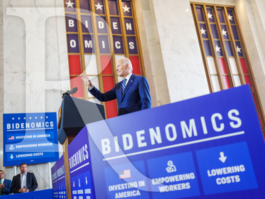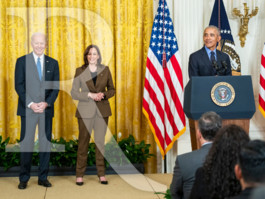As President, Obama Acts as Shop Steward in Chief
A Commentary By Michael Barone
Barack Obama has been at pains to convince voters that he cares about jobs. It seems to be a hard sell.
But he certainly can demonstrate that he cares about certain jobs -- the 7 percent of private-sector jobs and 36 percent of public-sector jobs held by union members.
During his two years and nine months as president, he has worked time and again to increase the number of unionized jobs. As for nonunion jobs, who wants them?
Some pro-union moves have a certain ritual quality. Democratic presidents on taking office seek to strengthen federal employee unions, just as Republican presidents on taking office seek to weaken them.
Other steps are more important. Fully one-third of the $820 billion stimulus package passed almost entirely with Democratic votes in 2009 was aid to state and local governments.
This was intended to keep state and local public employee union members -- much more numerous than federal employees -- on the job and to keep taxpayer-funded union dues pouring into public employee union treasuries.
It was just last year that, for the first time in history, public employees came to account for a majority of union members. This is a vivid contrast from the peak union membership years of the 1950s, when more than one-third of private-sector workers but almost no government workers were union members.
Which is not to say that the Obama administration has not looked after the interests of private-sector unions. In arranging the Chrysler bankruptcy, the Obama White House muscled aside the secured creditors who ordinarily have priority in bankruptcy proceedings in favor of United Auto Workers members and retirees.
That's an episode that I labeled "gangster government." Former Obama economics aide Lawrence Summers protested that his White House colleague Ron Bloom had made similar arrangements before. But in those cases, Bloom was working for the unions, not for a supposedly neutral government.
The 2009 stimulus package also contained Davis-Bacon law provisions requiring that construction workers be paid "prevailing wages," which under the bureaucratic formula turn out to be union wages. That means the public pays a premium for government construction.
It also means that Labor Department bureaucrats must calculate "prevailing wage" rates for as many as 3,141 counties. That takes time, and it's one reason there were not nearly so many shovel-ready projects as presidential rhetoric led some, including the president, to think.
In the meantime, the administration has gone to great pains to promote union representation in private-sector companies even where there's no indication employees want it.
It appointed pro-union stalwarts to the board supervising airline industry unionization elections. That board changed longstanding rules on what counts as a majority in an attempt to get unions approved at mostly non-union Delta after it absorbed mostly unionized Northwest.
The problem is that the employees kept voting against unionization anyway.
Then there's the Boeing case.
Obama has called for doubling American exports over the next five years. But when America's No. 1 exporter, Boeing, built a $1 billion Dreamliner plant in South Carolina, Obama's appointee as general counsel of the National Labor Relations Board brought a case to force it to shut down.
The theory is that Boeing needs to build the airliner in pro-union Washington state rather than in South Carolina, whose right-to-work law bars requiring employees to join unions. Maximizing union membership evidently comes first, before all other goals.
The Obama White House won't comment on the Boeing case, just as Obama himself had no comment when Teamsters President Jim Hoffa, introducing him at a Labor Day rally in Detroit, said of tea party backers, "Let's take these sons of bitches out."
The president's eloquent and apparently heartfelt pleas for civility voiced after the Tucson shootings apparently don't apply to union leaders.
Obama's partiality to unions is apparently rooted in a conviction that we would be better off if every employee were represented by a union.
The marketplace says otherwise. Private-sector unionism has produced the General Motors and Chrysler bankruptcies, while states with strong public-sector unions, according to a Harvard study, have to pay higher interest rates to borrow money.
But unions do have one positive characteristic from Obama's point of view: They funnel taxpayers' or consumers' money to the Democratic Party -- $400 million in 2008. So they get one payoff after another in return.
Michael Barone, senior political analyst for The Washington Examiner (www.washingtonexaminer.com), is a resident fellow at the American Enterprise Institute, a Fox News Channel contributor and a co-author of The Almanac of American Politics.
COPYRIGHT 2011 THE WASHINGTON EXAMINER
DISTRIBUTED BY CREATORS.COM
See Other Political Commentaries.
See Other Commentaries by Michael Barone.
Views expressed in this column are those of the author, not those of Rasmussen Reports. Comments about this content should be directed to the author or syndicate.
Rasmussen Reports is a media company specializing in the collection, publication and distribution of public opinion information.
We conduct public opinion polls on a variety of topics to inform our audience on events in the news and other topics of interest. To ensure editorial control and independence, we pay for the polls ourselves and generate revenue through the sale of subscriptions, sponsorships, and advertising. Nightly polling on politics, business and lifestyle topics provides the content to update the Rasmussen Reports web site many times each day. If it's in the news, it's in our polls. Additionally, the data drives a daily update newsletter and various media outlets across the country.
Some information, including the Rasmussen Reports daily Presidential Tracking Poll and commentaries are available for free to the general public. Subscriptions are available for $4.95 a month or 34.95 a year that provide subscribers with exclusive access to more than 20 stories per week on upcoming elections, consumer confidence, and issues that affect us all. For those who are really into the numbers, Platinum Members can review demographic crosstabs and a full history of our data.
To learn more about our methodology, click here.



